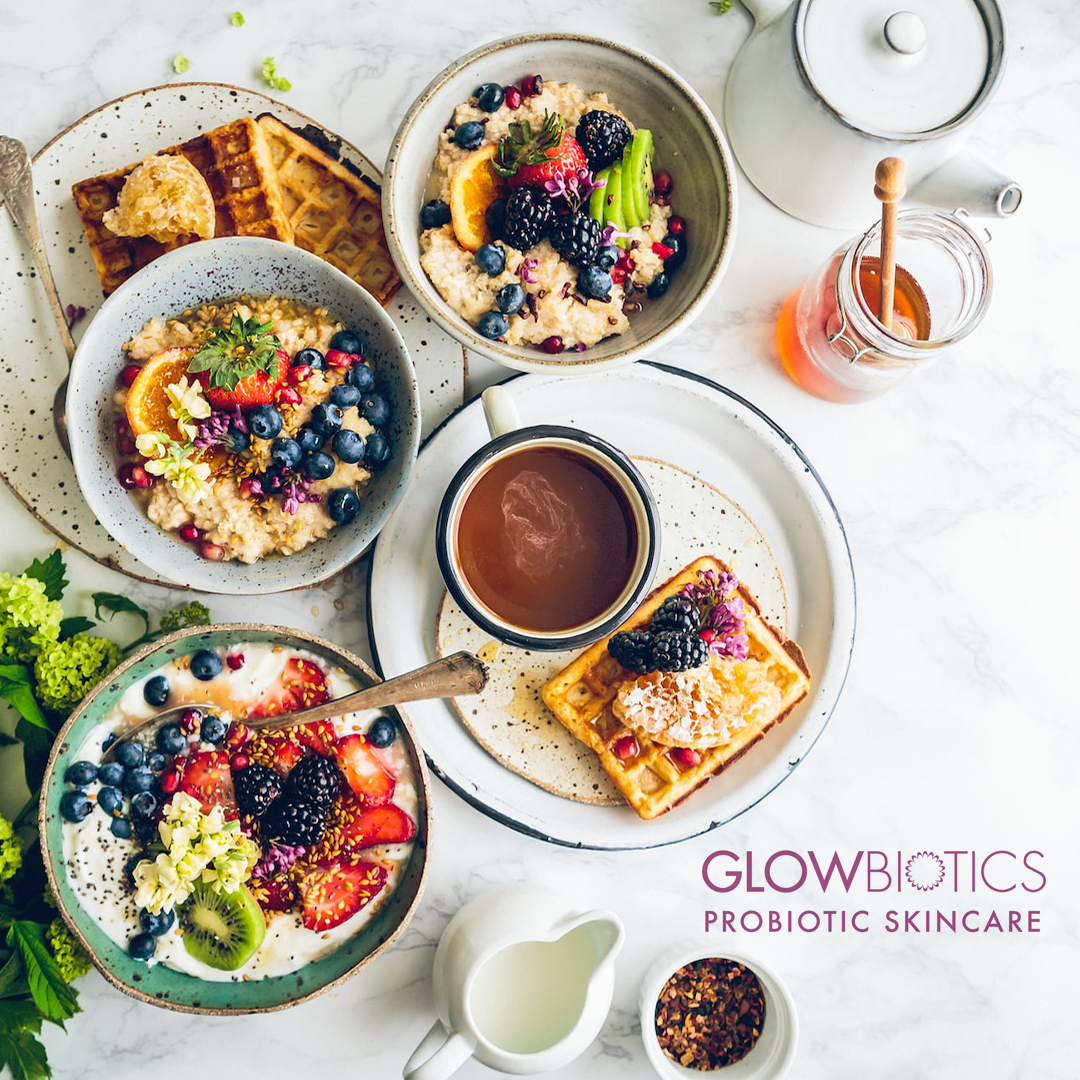
The Acne and Diet Connection
Share
How Your Diet Relates to Your Skin
One thing that can affect your skin is diet. Certain foods raise your blood sugar more quickly than others. When your blood sugar rises quickly, it causes the body to release a hormone called insulin. Having excess insulin in your blood can cause your oil glands to produce more oil, increasing your risks of acne.
Some foods to avoid for clear skin due to the trigger spikes in insulin include:
- Bread: white bread, bagels, naan, pita bread
- Rice: white rice, jasmine rice, arborio rice
- Cereals: instant oats, breakfast cereals
- Pasta and noodles: lasagna, spaghetti, ravioli, macaroni, fettuccine
- Starchy vegetables: mashed potatoes, potatoes, french fries
- Baked goods: cake, doughnuts, cookies, croissants, muffins
- Snacks: chocolate, crackers, microwave popcorn, chips, pretzels
- Sugar-sweetened beverages: soda, fruit juice, sports drinks
Because of their insulin-producing effects, these foods are considered “high-glycemic” carbohydrates. That means they are made of simple sugars.

Other researchers have studied the connections between a so-called “Western Diet” or “standard American Diet” and acne. These foods that can cause pimples are based on a diet of:
- Bread: white bread, bagels, naan, pita bread
- Rice: white rice, jasmine rice, arborio rice
- Cereals: instant oats, breakfast cereals
- Pasta and noodles: lasagna, spaghetti, ravioli, macaroni, fettuccine
- Starchy vegetables: mashed potatoes, potatoes, french fries
- Baked goods: cake, doughnuts, cookies, croissants, muffins
- Snacks: chocolate, crackers, microwave popcorn, chips, pretzels
- Sugar-sweetened beverages: soda, fruit juice, sports drinks
According to research reported in the Journal of Clinical, Cosmetic and Investigational Dermatology, these kinds of foods stimulate the production of hormones that can cause excess oil to be created and secreted by oil glands. They have also found that a Western Diet is linked to greater inflammation, which can also contribute to acne problems.
Foods to avoid for clear skin contain the following ingredients and are also thought to be beneficial for the skin because they reduce inflammation:
Possibly the worst news about diet and healthy skin is that chocolate is also believed to worsen acne, but it does not seem to affect all people, according to a study published in the Journal of Clinical and Aesthetic Dermatology Trusted Source.
Everyone’s body is different, and some people find that they get more acne when they eat certain foods. Looking at our information above, you can determine if these foods that cause pimples affect your skin. Under your doctor’s supervision, it can be helpful to experiment with your diet to see what works best for you.

Balancing Skin from The Outside
It’s more than what we put inside our bodies to achieve good skin health. For clearing blemishes and preventing breakouts is to adopt an acne routine that includes gentle, yet effective products featuring proven ingredients that can keep your skin clear, healthy, and hydrated.
General tips for managing acne include:
- washing the face gently twice a day and after sweating or playing sports
- do not over scrub skin, more is not always better
- try using an effective spot treatment on the blemishes
- using gentle, oil-free skin care products and cosmetics
- avoiding picking, scratching, or touching pimples
- avoiding prolonged exposure to the sun
Check out GLOWBIOITCS 2 acne home treatments kits.
Ingredients That Target Acne
Retinol
- If you’re not using retinol already, you’ve probably at least heard about it. This ingredient is a standby of premium skincare, with powerful cellular regeneration properties.
Retinol Benefits
- By stimulating collagen production, retinol is an industry mainstay for improving the look of fine lines and wrinkles. Note that retinol is best used at night, to protect those fragile new skin cells from contact with damaging UV rays. (Some skincare experts recommend wearing SPF the day after using retinol as well.)
Salicylic Acid
- Salicylic acid is a beta hydroxy acid (BHA) that helps exfoliate and allow dry, dead skin cells to microscopically flake off the skin. Because it is oil soluble, it can penetrate oil glands in the skin to unclog pores as well as fight inflammation. Salicylic acid works to alleviate razor bumps and allows ingrown hair to make its way out of the pore.
Salicylic Benefits
- While in the pores, salicylic acid dissolves the debris that clogs pores, and its anti-inflammatory properties reduce redness, irritation and itching. This means that when ingrown hairs become infected and pustules and pimples occur, they will heal faster and will reduce the number of skin imperfects dramatically.
- In concentrations of two percent, salicylic acid is gentle enough for everyday use. Even sensitive skin responds well to a face wash that contains this ingredient, due to the anti-inflammatory benefit.
Probiotics
- Probiotics are the microorganisms themselves and naturally live on the surface of the skin, creating a protective veil referred to as the skin’s microbiome. When your skin’s microbiome is in balance, it helps offset factors that can negatively influence skin, such as factors that lead to redness, dryness, and a weakened surface that more quickly shows signs of aging from environmental attack.
Probiotic Benefits
- These healthy microorganisms help to balance the skins microbiome, that protective barrier comprised of healthy bacteria and not-so-healthy bacteria (you need a balance of both for well-balanced skin). Probiotics also are anti-inflammatory and help to relieve irritated skin.
Remember when starting a new skincare regimen to use a product over at least six weeks, once or twice daily, to notice a difference. Remember the more you jump from product to product, the longer it will take to see results.
Taking the time to care for ourselves should no longer be considered an indulgence, or even a luxury. Rather, for so many reasons, it's a necessity.
